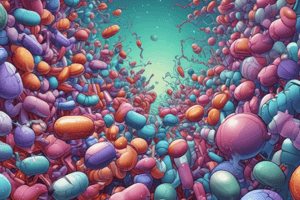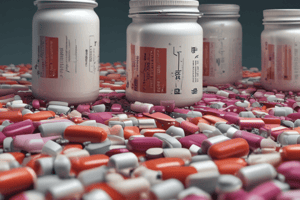Podcast
Questions and Answers
What is the primary route of excretion for erythromycin and azithromycin?
What is the primary route of excretion for erythromycin and azithromycin?
- Lungs
- Kidneys
- Bile (correct)
- Liver
How does food affect the absorption of erythromycin and azithromycin?
How does food affect the absorption of erythromycin and azithromycin?
- Variable effect
- Decreases absorption (correct)
- No effect
- Increases absorption
What is the half-life of azithromycin?
What is the half-life of azithromycin?
- 6-8 hours
- 1-1.5 hours
- 40-60 hours (correct)
- 12-24 hours
What percentage of azithromycin is bound to proteins?
What percentage of azithromycin is bound to proteins?
What is a characteristic of azithromycin's tissue penetration?
What is a characteristic of azithromycin's tissue penetration?
What is a characteristic of erythromycin's microsomal enzyme inhibition?
What is a characteristic of erythromycin's microsomal enzyme inhibition?
What is a characteristic of azithromycin's spectrum of activity?
What is a characteristic of azithromycin's spectrum of activity?
What is a characteristic of erythromycin's gastric acid stability?
What is a characteristic of erythromycin's gastric acid stability?
Which of the following is true about the spectrum of activity of erythromycin?
Which of the following is true about the spectrum of activity of erythromycin?
Which of the following are considered macrolide antibiotics?
Which of the following are considered macrolide antibiotics?
What is the primary mechanism of action of macrolides?
What is the primary mechanism of action of macrolides?
At therapeutic doses, macrolides are primarily known for which effect?
At therapeutic doses, macrolides are primarily known for which effect?
Which of the following infections can be treated with erythromycin?
Which of the following infections can be treated with erythromycin?
Which bacterium is treated with azithromycin?
Which bacterium is treated with azithromycin?
In which situation is erythromycin commonly used?
In which situation is erythromycin commonly used?
What is a common bacterial infection treated with clarithromycin?
What is a common bacterial infection treated with clarithromycin?
What is a common side effect of motilin activation?
What is a common side effect of motilin activation?
Which form of erythromycin is most likely to cause cholestatic jaundice?
Which form of erythromycin is most likely to cause cholestatic jaundice?
Which macrolide antibiotic was first isolated in 1952?
Which macrolide antibiotic was first isolated in 1952?
What effect do higher doses of macrolides have on bacteria?
What effect do higher doses of macrolides have on bacteria?
Which of the following is NOT a common hypersensitivity reaction to erythromycin estolate?
Which of the following is NOT a common hypersensitivity reaction to erythromycin estolate?
What cardiac side effect is erythromycin known to be associated with?
What cardiac side effect is erythromycin known to be associated with?
How does azithromycin compare to erythromycin in terms of spectrum of activity?
How does azithromycin compare to erythromycin in terms of spectrum of activity?
What is the role of antitoxin in infections caused by Corynebacterium diphtheriae?
What is the role of antitoxin in infections caused by Corynebacterium diphtheriae?
What does the term "cross-resistance" mean in the context of azithromycin and erythromycin?
What does the term "cross-resistance" mean in the context of azithromycin and erythromycin?
Which condition is Azithromycin the drug of choice for?
Which condition is Azithromycin the drug of choice for?
Which of these statements is TRUE regarding motilin activation?
Which of these statements is TRUE regarding motilin activation?
Which antibiotic is indicated for the treatment of community-acquired pneumonia of mild severity?
Which antibiotic is indicated for the treatment of community-acquired pneumonia of mild severity?
Which of these is a side effect specifically associated with the estolate form of erythromycin?
Which of these is a side effect specifically associated with the estolate form of erythromycin?
What type of distress is an adverse effect of erythromycin?
What type of distress is an adverse effect of erythromycin?
Which statement accurately describes the relationship between azithromycin and erythromycin?
Which statement accurately describes the relationship between azithromycin and erythromycin?
Which adverse effect of erythromycin is due to motilin-receptor agonism?
Which adverse effect of erythromycin is due to motilin-receptor agonism?
What condition is not treated by Azithromycin?
What condition is not treated by Azithromycin?
Which of the following is a use for Clarithromycin?
Which of the following is a use for Clarithromycin?
Which pathogen is associated with acute otitis media treated by Clarithromycin?
Which pathogen is associated with acute otitis media treated by Clarithromycin?
Which of the following is not an indication for Azithromycin?
Which of the following is not an indication for Azithromycin?
What is the primary mechanism of action of vancomycin and teicoplanin?
What is the primary mechanism of action of vancomycin and teicoplanin?
Which part of the bacterial cell wall do vancomycin and teicoplanin bind to?
Which part of the bacterial cell wall do vancomycin and teicoplanin bind to?
What is the primary effect of vancomycin and teicoplanin binding to the bacterial cell wall?
What is the primary effect of vancomycin and teicoplanin binding to the bacterial cell wall?
Why are vancomycin and teicoplanin ineffective against Gram-negative bacteria?
Why are vancomycin and teicoplanin ineffective against Gram-negative bacteria?
Which of the following is NOT a characteristic of vancomycin and teicoplanin?
Which of the following is NOT a characteristic of vancomycin and teicoplanin?
What is the primary reason for the bactericidal action of vancomycin and teicoplanin?
What is the primary reason for the bactericidal action of vancomycin and teicoplanin?
What is a potential consequence of an imperfect cell wall in bacteria treated with vancomycin or teicoplanin?
What is a potential consequence of an imperfect cell wall in bacteria treated with vancomycin or teicoplanin?
What is the most likely reason for the limited effectiveness of vancomycin and teicoplanin against Gram-negative bacteria?
What is the most likely reason for the limited effectiveness of vancomycin and teicoplanin against Gram-negative bacteria?
Which of the following best describes the mechanism of action of vancomycin and teicoplanin?
Which of the following best describes the mechanism of action of vancomycin and teicoplanin?
Study Notes
Macrolides
- Commonly used family of antibiotics, with erythromycin as the first member isolated in 1952 from Streptomyces erythreus.
- Key macrolides include erythromycin, clarithromycin, azithromycin, and roxithromycin.
Mechanism of Action
- Macrolides inhibit RNA-dependent protein synthesis by binding to the 'P' site on the 50S ribosomal subunits.
- This binding disrupts peptidyl tRNA dissociation, suppressing protein synthesis and inhibiting bacterial growth.
- They are generally bacteriostatic at therapeutic doses but can be bactericidal at higher doses.
Therapeutic Uses
- Erythromycin:
- Effective for penicillin-allergic patients and prophylaxis against bacterial endocarditis.
- Treats respiratory tract infections caused by Streptococcus pyogenes and pneumoniae, Mycoplasma pneumoniae, and pertussis.
- Used in diphtheria cases as an adjunct to antitoxin.
- Azithromycin:
- Treats acute bacterial exacerbations in chronic obstructive pulmonary disease.
- Effective for community-acquired pneumonia and streptococcal pharyngitis/tonsillitis.
- Drug of choice for non-gonococcal urethritis and cervicitis.
- Clarithromycin:
- Indicated for pharyngitis, acute maxillary sinusitis, bacterial bronchitis exacerbations, and otitis media.
- Useful for community-acquired pneumonia due to multiple pathogens.
Adverse Effects of Erythromycin
- Epigastric distress: Degraded to a hemiketal intermediate causing gastrointestinal contractions, leading to discomfort, nausea, and diarrhea.
- Cholestatic jaundice: Associated with the estolate form, likely due to hypersensitivity.
- Hypersensitivity reactions: May present as skin rashes, fever, and eosinophilia.
- Cardiac side effects: Can prolong QT interval and cause ventricular arrhythmias, including torsades de pointes.
Comparison: Erythromycin vs. Azithromycin
- Azithromycin: Semisynthetic derivative with broader activity and cross-resistance with erythromycin.
- Food absorption: Both affected; erythromycin requires enteric coating for stability.
- Half-life: Erythromycin (1-1.5 hours) vs. Azithromycin (40-60 hours).
- Protein binding: Erythromycin (70%) vs. Azithromycin (12-50%).
- Tissue penetration: Erythromycin has poor penetration; azithromycin shows high penetration, especially in infected tissues.
- Spectrum of activity: Erythromycin is more effective against gram-positive bacteria, while azithromycin includes gram-negative bacteria and chlamydia.
Glycopeptide Antibiotics
- Vancomycin & Teicoplanin Mechanism of Action:
- Both are bactericidal, inhibiting cell wall synthesis.
- Bind to D-alanyl-D-alanine in peptidoglycan, preventing elongation and cross-linking.
- Leads to formation of an imperfect cell wall, causing cell swelling and bursting.
- Alters cytoplasmic membrane permeability but is ineffective against gram-negative organisms due to larger size.
Uses and Adverse Effects of Vancomycin
- Vancomycin is administered intravenously for various bacterial infections.
- Adverse effects include nephrotoxicity, ototoxicity, and infusion-related reactions (Red Man syndrome).
Studying That Suits You
Use AI to generate personalized quizzes and flashcards to suit your learning preferences.
Related Documents
Description
This quiz covers macrolides, a family of antibiotics, including their discovery, derivatives, and types. It also touches on glycopeptide antibiotics.




